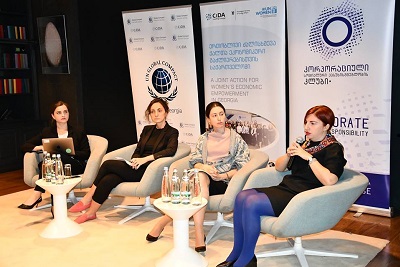Private sector increasingly involved in addressing sexual harassment in the workplace
Date:
The global #MeToo campaign, sexual harassment in the workplace and in public spaces, and prevention and regulation concerning sexual harassment have been receiving increasing attention among various stakeholders, including the private sector, in Georgia.

Supported by UN Women and the civil society organization PROLoG, the Gender Equality Council of the Parliament of Georgia has drafted amendments to the existing legislation to prevent and respond to sexual harassment. The amendments address sexual harassment in both public and private spaces and may affect the Labour Code, Administrative Code, Civil Procedure Code, Law on the Public Defender and other relevant legislation regulating the public service sector.
With the purpose of informing the private sector about the proposed legislative changes, UN Women in partnership with the civil society organization CiDA organized a workshop during the 2018 Corporate Social Responsibility week “Business for Sustainable Development Goals”. Members of the CSR Club and the UN Global Compact Local Network Georgia as well as MP Dimitri Tskitishvili, a member of the Gender Equality Council, exchanged their views on the role of businesses in tackling the problem.
“Prevention of and effective response to sexual harassment greatly depend on the policy and approach of each company. Therefore, private business plays a critical role in contributing to the eradication of sexual harassment from all workplaces,” noted Mr. Tskitishvili.
Several companies who are signatories to the Women’s Empowerment Principles: Equality Means Business (WEPs) have already taken the first steps to deal with the issue. Two private companies - PR company GEPRA and construction company M2 - have introduced internal complaint mechanisms, and hospitality chain Adjara Group has also embarked on such an initiative.
Shorena Darchiashvili, Deputy Director of M2, remarked: “Legislative amendments are important for improving the situation. I think, however, that not only public sector employers but also we, private employers, should proactively contribute to preventing and responding to sexual harassment.”
The event was held within the framework of the project “A Joint Action for Women’s Economic Empowerment in Georgia”, which is implemented by UN Women with the financial support of the Ministry of Foreign Affairs of Norway.